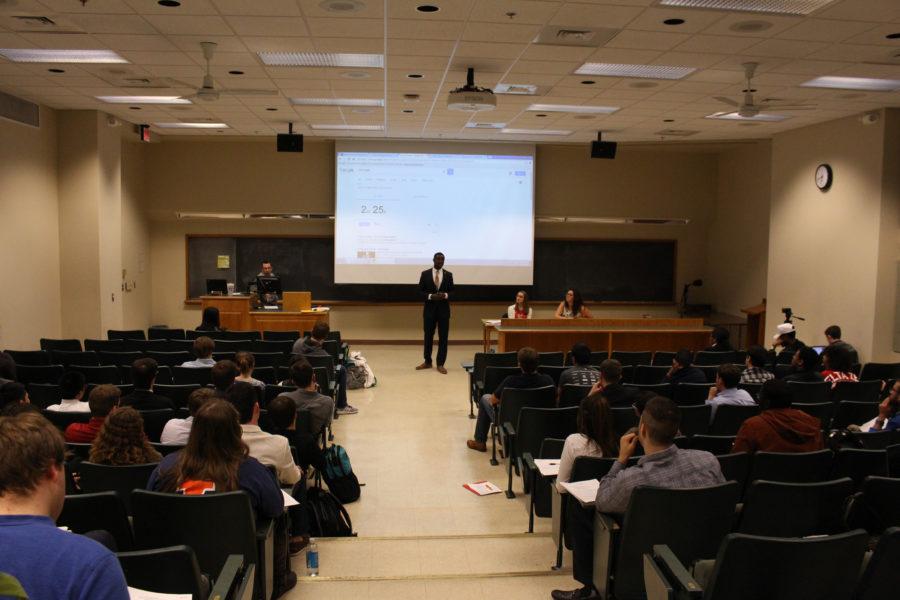Illinois Student Senate elects student body president, vice presidents, treasurer
Illinois Student Senate holds elections for student president at the Psychology Building on Tuesday, Mar. 29, 2016
March 29, 2016
Last spring, photos on social media of members of the Alpha Phi sorority and Acacia fraternity dressed in sombreros and turbans solicited a variety of responses.
“Not Just a Party,” a Facebook group of student activists, made a series of demands including, but not limited to a three-year suspension of the UIUC chapters of Acacia fraternity and Alpha Phi sorority, diversity training for all Greek organizations and expulsion of those depicted in the photo from any Greek organizations to which they belong.
Some of their perspectives have found their way into the Illinois Student Senate.
Resolution CA.2017.03 ISS Diversity and Inclusion Action Plan 13 reached the senate floor to some contention on Wednesday.
Sponsored by Vice President Internal Spencer Haydary, the bill resolves to improve relationships between the senate and student activist groups and encourages the “administration to create more substantial consequences for communities, such as registered student organizations, registered organizations, related organizations, and Greek organizations, involved in behavior that is not culturally inclusive, engaged in acts of intolerance, or engaged in acts that violate community standards.”
Debate over the resolution ensued, with some senators vying to strike the clause asking for “substantial consequences.” Some argued the resolution unfairly targeted Greek organizations.
Get The Daily Illini in your inbox!
Senator James Butkus proposed that the Senate strike the clause, arguing that it unfairly targeted Greek organizations. He mentioned under the resolution’s current wording that his fraternity, Phi Gamma Delta, might be reprimanded for offending Pacific Islanders.
After debate, the resolution was sent back to committee without a clear decision on the topic.
Senator Rahul Raju argued that the provision didn’t single out Greek life, rather, it is a bill to improve what he sees as a broken “status quo.”
“I think I speak on the behalf of many members of the University community when I say that we all aspire to hold ourselves to a higher standard,” Senator Rahul Raju said. “That includes Greek life, that includes many parts of campus. The idea behind this clause is to make sure we include all organizations when we talk about the idea that we must hold ourselves to a higher standard.”
Vice President External Alex Villanueva felt that the clause should be struck because it infringed on students’ rights to “be an idiot.”
“At the end of the day, if you want to dress up in something offensive, if you want to wear a mustache and sombrero like I’ve seen many times in Red Lion, that’s your right to do so,” Villanueva said. “At the end of the day, you’re embarrassing yourself.
People are judging you, people are looking at you. I don’t think the University should have any business punishing you with workshops, etc., etc., for exercising your right to be an idiot.”
Vice President Internal Spencer Haydary responded to Villanueva’s point.
“This isn’t necessarily punishing freedom of speech because no freedom in the constitution is absolute, and that includes hate speech,” he said. “So if it comes to something like that, and the proper investigation has been taken, then something like that should have consequences, repercussions, whatever you want to call it.”
Senator Patricia Rodriquez spoke to calm fellow senators who felt the bill asked for extreme consequences for intolerant acts. She said “more extreme consequences” referred to educating offenders, not expulsion or suspension.
“Don’t look at this as if you do something that’s intolerant that you’re going to be suspended or expelled — it’s more, something to make the situation better,” she said.
However, the ambiguity of the phrase “substantial consequences” caused debate in the Senate. The bill will be brought up again for debate at a later date. In the meantime, the language has not changed since Wednesday’s meeting.
“We’re not sure what ‘substantial consequences’ mean,” Senator Trevor Wiles, who argued in favor of striking the clause, said. “To read in any sort of consequence is to read in the intent of the language.”







